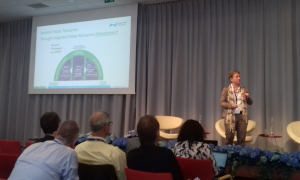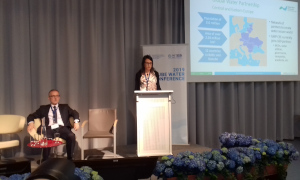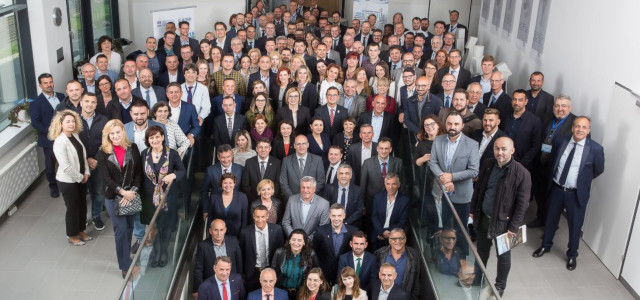The event brought together 200 people coming from 25 countries representing all stakeholders of the water sector to discuss the way forward towards smart policies, strong utilities and sustainable services. As quoted in the Danube Water Programme, the key for resilience are smart policies, strong utilities and sustainable water and wastewater sector.
In her keynote speech Monika Weber-Fahr, CEO of the Global Water Partnership,  pointed out that resilience is the ability to “bounce back” after a shock or negative development and talked among others about the importance of resilient leadership to build a resilient water sector. Other topics discussed in the two days include cooperation as a tool to achieve resilient services, financing for resilient water infrastructure projects as well as the upcoming component on water security, which is to be developed by the World Bank under the third phase of the Danube Water Program.
pointed out that resilience is the ability to “bounce back” after a shock or negative development and talked among others about the importance of resilient leadership to build a resilient water sector. Other topics discussed in the two days include cooperation as a tool to achieve resilient services, financing for resilient water infrastructure projects as well as the upcoming component on water security, which is to be developed by the World Bank under the third phase of the Danube Water Program.
A special session was dedicated to achieving resilient wastewater treatment. It was shown that a lot of progress was done in the region concerning wastewater collection and treatment as demanded by Urban wastewater Directive, however small settlements that are not covered by the directive are lagging behind. In Central and Eastern Europe there is 42 million people that live in settlements with less than 2000 inhabitants where wastewater is mainly collected in leaking septic tanks and represent dispersed pollution of surface and groundwaters.
 GWP CEE is aware that the selection of appropriate managerial practices and treatment technologies, is of significant importance for sustainable wastewater treatment in these areas. As it was presented by Dr. Darja Istenič, sustainable sanitation expert from University of Ljubljana, the technologies should be robust, simple to operate and with low operation and maintenance costs. Moreover, the technologies should integrate with agriculture which has high demands for nutrients and water. "Decentralized wastewater collection and treatment with nature-based solutions can meet all these criteria, moreover, nature-based solutions enable additional services like draught mitigation and flood protection and increase wellbeing. Therefore, GWP CEE will further support the dialogue between scientific community on one side and practitioners and policy level on the other. There is a need to attract more governmental institutions into this topic and set a firm background for renovation of policies regarding sustainable sanitation in small settlement.", emphasized Dr. Istenič.
GWP CEE is aware that the selection of appropriate managerial practices and treatment technologies, is of significant importance for sustainable wastewater treatment in these areas. As it was presented by Dr. Darja Istenič, sustainable sanitation expert from University of Ljubljana, the technologies should be robust, simple to operate and with low operation and maintenance costs. Moreover, the technologies should integrate with agriculture which has high demands for nutrients and water. "Decentralized wastewater collection and treatment with nature-based solutions can meet all these criteria, moreover, nature-based solutions enable additional services like draught mitigation and flood protection and increase wellbeing. Therefore, GWP CEE will further support the dialogue between scientific community on one side and practitioners and policy level on the other. There is a need to attract more governmental institutions into this topic and set a firm background for renovation of policies regarding sustainable sanitation in small settlement.", emphasized Dr. Istenič.
